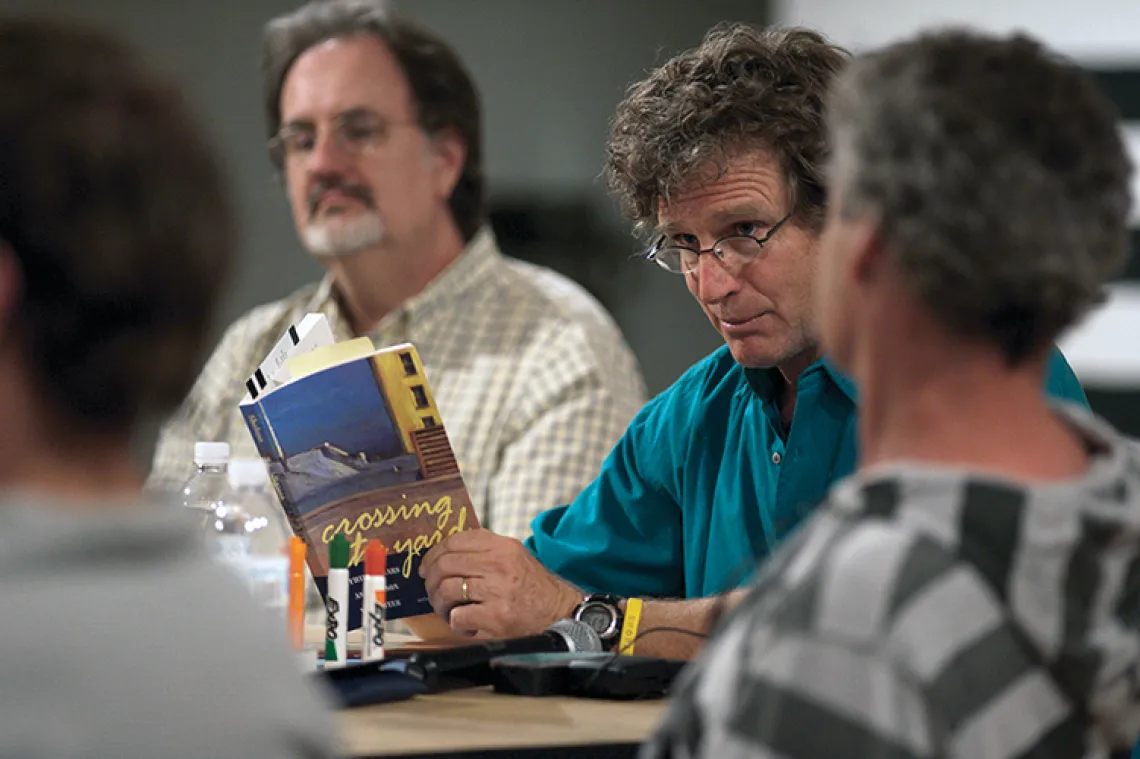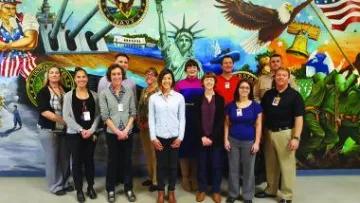Expanding Prison Education
Thanks to a donation to the Department of English by Barbara Martinsons, the Prison Education Project is training graduate students and faculty to help with prison writing workshops and expanding the number and topics of classes at local prisons.

Erec Toso holding Richard Shelton’s book during a 2011 program called “Inside/Outside Prison Writing Workshop.”
Courtesy of ASU Art Museum.
About 25 years ago, Barbara Martinsons was teaching at Marymount Manhattan College, a small college in New York City. The faculty received notes in their mailboxes asking if they wanted to trade a class in the college for teaching a class in a prison. Martinsons said ‘yes’ and taught “Sociology of Film” at Bedford Hills Correctional Facility, the state’s only maximum-security prison for women.
“The experience changed the direction of my life and gave me a sense of vocation,” Martinsons said.
Later, Martinsons moved to upstate New York and began teaching at Sullivan Correctional Facility, a maximum-security prison for men. Along the way, she became a board member for Hudson Link for Higher Education in Prison and started the nonprofit College and Community Fellowship (CCF), which helps women coming out of prison who are interested in going to college.
Martinsons now lives part of the year in Tucson and is retired from teaching. But she is still dedicated to promoting education for those currently in or coming out of the prison system. She remains on the boards of Hudson Link and CCF and mentors people coming out of prison through Old Pueblo Community Services.
Martinsons has also made a sizable donation to the Department of English to help it expand the Prison Education Project.
“Most of the people in prison are going to come out,” Martinsons said. “Education can make them stronger citizens, parents, and participants in their communities. I think demanding college work can give a person a new way of being in the world and a new way of coping with difficulties.”
Hungry for Education
Every Saturday, Erec Toso dons his khaki “prison pants” – the only pair he owns that the Arizona State Prison will allow inside the yard. Toso then drives to the south side of Tucson, passes through security with his cracked plastic tub filled with notebooks and pencils, and conducts a pair of two-hour creative writing workshops for incarcerated men.
About 15 men usually show up to each of Toso’s workshops. They can write anything they want – poems, fiction, memoirs. They comment on one another’s work.
Toso mentions one man with a shaved head and crude tattoos, in jail for dealing ecstasy.
“If he were at the University of Arizona, he would likely be one of the star students in film or writing courses,” Toso said. “He works hard at his craft, taking it far more seriously than even my best university students. He devours the books on writing that I bring in.”
“Most of the people in prison are going to come out. Education can make them stronger citizens, parents, and participants in their communities.”
—Barbara Martinsons
Toso, an assistant professor of English, has taught prison writing workshops for 10 years, joining program founder Richard Shelton and writer Ken Lamberton as part of a team that leads the 48-year-old program. Administratively housed at the UA Poetry Center, the program benefited early on from grants from Arizona Commission on the Arts and is currently funded with an annual grant from the Lannan Foundation.
Thanks to the donation from Martinsons, Toso has gained reinforcements as graduate students and faculty obtained training to help with the workshops.
Another new UA program that offers courses to incarcerated individuals is coordinated by Marcia Klotz, an assistant professor in the Department of English, and Colleen Lucey, an assistant professor in the Department of Russian and Slavic Studies. The program also involves several graduate students.

Last spring, the group offered a 10-week pilot program at the Whetstone Unit in the Arizona State Prison Complex to incarcerated veterans in the “Regaining Honor” pod. The team taught literature and writing skills. This past fall, two faculty members and 11 graduate students taught on the topic of “Justice and Mercy.”
The incarcerated students are awarded certifications of completion, although the instructors would like them to be able to receive college credit.
“These men are hungry for education,” said Lucey. “When we ask them what topics they are most interested in, they say ‘yes, yes, yes’ to everything.”
Klotz and Lucey hope to broaden the range of courses and get more instructors participating. This semester, UA faculty members will deliver lectures as diverse as how elephants experience trauma, archaeological findings in the Easter Islands, Edgar Allan Poe, Caribbean literature, and an introductory class in astronomy, math, and physics.
“We hope to help them imagine a number of options for the future and to get a sense of what it’s like to go to college,” Klotz said. “I feel so honored to teach them.”
“Our students and faculty are excited to bring the English department’s passion for words to inmates at the Tucson prison complex,” said Lee Medovoi, head of the Department of English. “We are so grateful to Barbara Martinsons for helping us to build a strong and committed team that can make a real difference for the future of our community.”
Bringing Reginald Dwayne Betts to Campus
Barbara Martinsons helped fund the visit of Reginald Dwayne Betts to the UA campus this past fall. Betts – a poet, memoirist, and lawyer – is the national spokesperson for the Campaign for Youth Justice. He also spent nine years in jail when he was sentenced as an adult at age 16.
During the visit, which was sponsored by the College of SBS and the American Friends Service Committee, Betts gave the keynote speech at the symposium “Building the Prison-to-Higher-Education Pipeline.”
“The symposium drove home the need to develop programming that facilitates the educational enrichment of system-involved persons, whether inside or outside prison,” said John Paul Jones III, dean of the College of SBS. “I came away convinced that we have an ethical duty to rethink and rework our institution’s policies and practices around access for incarcerated individuals. We also have a social responsibility to welcome students who have been system-involved into our classrooms.”
Betts will also collaborate with the UA Poetry Center on a three-year project funded by a $500,000 Art for Justice grant to commission new work from leading writers in conversation with the crisis of mass incarceration in the United States.

